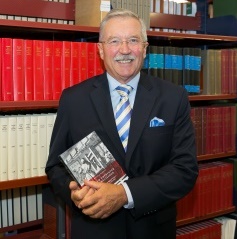 District Court judge and university law lecturer David Harvey has another string to add to his legal bow, with his PhD being published as a book.
The Law Emprynted and Englysshed –
District Court judge and university law lecturer David Harvey has another string to add to his legal bow, with his PhD being published as a book.
The Law Emprynted and Englysshed – sub-titled The Printing Press as an Agent of Change in Law and Legal Culture 1475-1642
– has been printed by leading legal publisher, Hart Publishing of Oxford.
The book examines the way in which law printing developed in the period from 1475 up until 1642 and the start of the English Civil War.
Harvey said the regulation of print was played out against a back-drop of political intrigue, religious fervour and social change punctuated by the whims of Kings and Queens: “It was a very exciting period.”
In fact, he could not pinpoint the most interesting aspect, saying: “all of it!”
“Some consider it to be all about censorship, but I don’t think it was. I think it was about the printing industry itself trying to stop unauthorised people getting into the business. The issue was not censorship but industry control.
“Some early writers saw the change from manuscript to print as beneficial, others didn’t. There was a coterie which preferred sharing hand written notes and considered there was a stigma attached to print.
“For example, Shakespeare didn’t take to print immediately, Ben Jonson rushed into print and was frowned upon in literary circles, and John Donne would not allow his work to be printed.”
Harvey completed his PhD over seven years part-time while serving full-time as a District Court judge and part-time as a law lecturer at the
University of Auckland.
The PhD began as a plan to research and write about his specialist field of information technology and its effect upon the law.
“Then it changed into an historical study addressing the impact of the first information technology upon the law, primarily because the reverberations of the introduction of information technologies are still being felt and will be for some time.”
Harvey told NZLawyer that he finds the whole purpose of the law as an inspiration.
“We are part of a continuum that is the law and that will continue as long as there is civilised society. That’s a pretty inspiring concept.”
He attributed his ability to juggle working as a judge and law lecturer while completing a PhD to good time management.
“I am very, very disciplined in terms of what can be achieved in a certain amount of time and then doing it.”
He also acknowledged the support of his family. ”Patience and forbearance have been the hallmarks of their tolerance of what must appear to be an obsession with the printing press and its impact upon the law and legal culture in a time long forgotten and of little seeming relevance.”
Quick questions with Judge David Harvey
What would you say is the main thing that motivates or drives you in your work?
To fill the unforgiving minute with sixty seconds worth of distance run (Kipling, "If")
You are obviously an extremely busy person – what do you do to unwind?
Read - play the odd computer game - take photographs
Is there any piece of advice you’d give to budding young lawyers who aspire to you?
Two conflicting statements, both valid:
a) carpe diem, quam minimum credula postero (seize the day trusting as little as possible in the next) (Quintus Horatius Flaccus, Odes 1.11)
b) Don't stop thinking about tomorrow (Fleetwood Mac)

 District Court judge and university law lecturer David Harvey has another string to add to his legal bow, with his PhD being published as a book.
District Court judge and university law lecturer David Harvey has another string to add to his legal bow, with his PhD being published as a book.